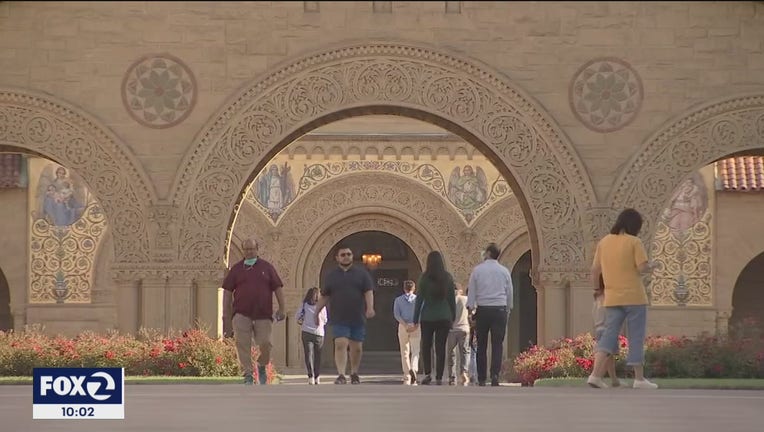Stanford updates COVID-19 protocol for fall quarter

PALO ALTO, Calif. - Classes are set to resume in-person on campus at Stanford University September 20. Now there are some updates to their COVID-19 safety protocol.
The updates, announced on Thursday, mostly have to do with masks, student parties, and how the University will be managing positive cases.
We already knew the University was taking some extra-precautions by testing vaccinated students once a week for the novel coronavirus.
The weekly COVID testing policy applies to onsite students, staff, faculty and postdocs who are fully vaccinated. For those who aren't, they are subject to testing twice a week.
Stanford's Associate Vice Provost for Environmental Health and Safety, Russell Furr, issued a notice to the community, stressing the importance of combining being vaccinated and wearing face coverings and how effective that is to protect yourself against COVID, now that the delta variant has taken hold in the U.S.
"Such an environment – highly vaccinated, with mask wearing in many settings – is what we expect to have at Stanford this fall. With the Delta variant, we continue to see some COVID-positive cases among vaccinated individuals. Typically the symptoms range from nonexistent to mild to moderate, and do not involve hospitalization," Furr wrote.
As a result, the University is now suggesting wearing masks at crowded outdoor events where six-feet of distance from others cannot be consistently maintained.
"Outdoor events with food are still allowed, and you can lower a face covering to eat – but use good judgment and maintain distance from others when doing so," University officials said.
The University points to a recent Centers for Disease Control and Prevention study that shows unvaccinated people are five times more likely to experience COVID infections than those who have had their doses and that they are 29 times more likely to experience hospitalization compared to their fully-vaccinated counterparts.
The bottom line is; the risk of COVID-19 transmission is very low in masked settings among vaccinated individuals.
The proverbial hammer comes down on students having indoor parties – at least for now. Those won't be permitted at least until October 8. Residence hall meetings will still be allowed, as will private gatherings in students' dorm rooms, but school officials recommend limiting capacity to, "no more than four times the occupancy in attendance."
Along with the indoor masking policy already in place, Stanford's dining halls will have limited seating capacity and to-go options will be available. Students in the dining halls are required to wear masks, but like most other cases, may remove them when actively eating and drinking.
In models developed by Cornell University, research found that, "in classrooms at full capacity, the risk of transmission from one masked, vaccinated person to another is estimated to be 99.5% lower than the risk between unvaccinated occupants not wearing masks."
Stanford officials said the positive cases they have seen among students appear to be the result of arrival from travel and social gatherings.
In July, seven students, who were all vaccinated, tested positive for COVID after the university had loosened testing requirements. The students were all symptomatic.
Since then, a rigorous arrival testing policy has been implemented. Also, new this fall will be the return of in-person learning on campus. Positive cases upon arrival will rapidly be isolated, officials said. This is based on policies enforced last academic year, which, according to Stanford, resulted in virtually no secondary transmissions on campus.
In the event an individual in a class tests positive for COVID, the registrar's office will notify everyone in the class of the potential exposure without identifying the individual. Because of Stanford's classroom environment, students and staff will not be considered high-risk contacts, unless found to be otherwise from contact outside the classroom setting. Students and staff from the classroom will be encouraged to monitor for symptoms and stay home if they get sick.
Individuals who have had high-risk contact with someone who is COVID positive are generally recommended to remain offsite or isolated at their residence.
Isolated students who are sick or quarantining will be supported by instructors on how to access course materials.
Students living in dorms will be notified of positive cases on their floors and in the halls at student residences by email.
For the full details on this announcement, click here.

